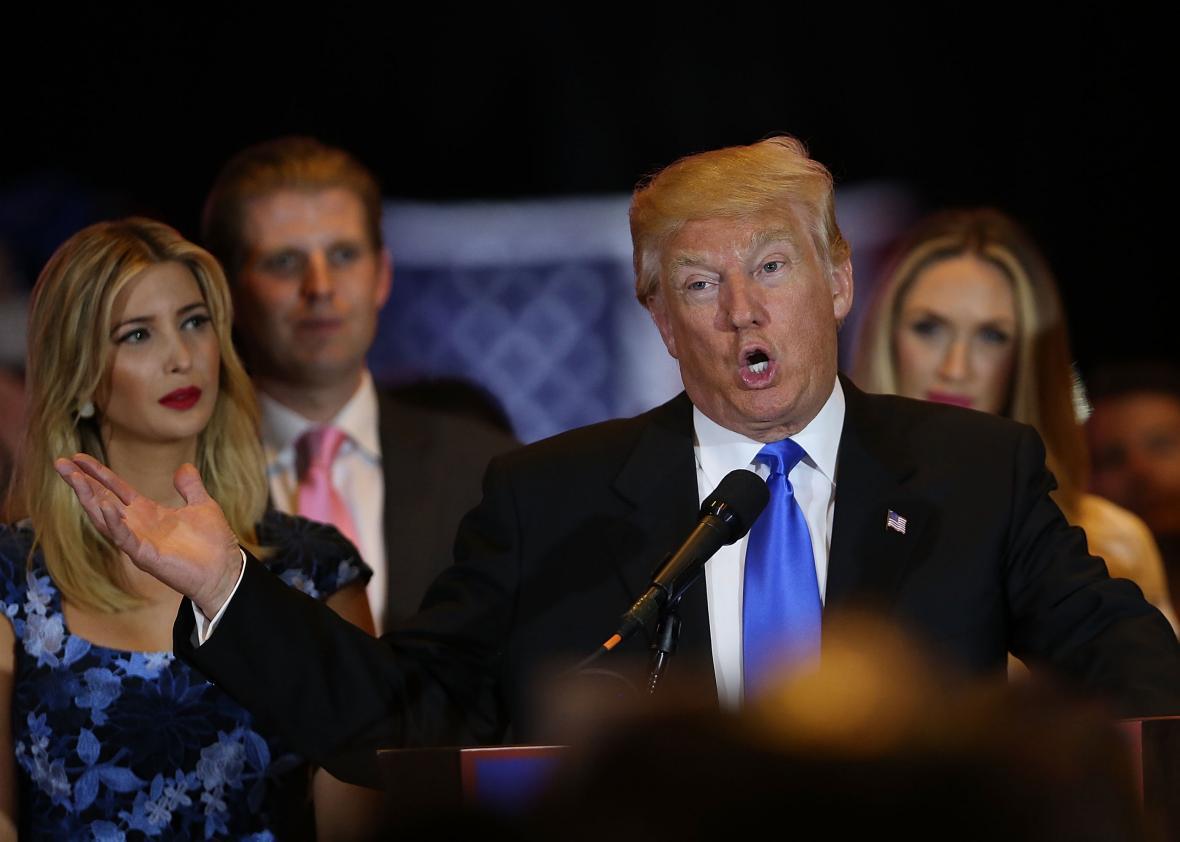Donald Trump claimed his status as the presumptive Republican nominee on Tuesday with a restrained victory speech that hinted at a possible principal line of general election attack against his Democratic counterpart Hillary Clinton.
“She doesn’t understand trade,” Trump said after his win in Indiana forced Sen. Ted Cruz to drop out of the race and all-but cemented the nomination for the real estate mogul. “Her husband signed perhaps in the history of the world the single worst trade deal ever done. It’s called NAFTA.”
This emphasis on workers and trade was incredibly similar to the speech he gave after his critical Super Tuesday II victories on March 15 that eliminated Sen. Marco Rubio from the primary field. “Apple, and all of these great companies will be making their great products in the United States, not in China, Vietnam,” Trump said at the time of what a Trump presidency would mean.
That was a more general speech about how he’d be the candidate of working-class voters on the issue of trade, specifically the protectionist candidate (you can read more here about how disastrous the economic policies he’s hinted at would be for the economy). This time, he hit Clinton by name on trade and also focused on another area of possible vulnerability, specifically her policies and speech on energy jobs. Trump mentioned how Hillary said in March that “we’re going to put a lot of coal miners and coal companies out of business.” She apologized to a tearful, recently laid off coal miner on Monday for those remarks, but this is clearly still a weakness that Trump plans to exploit.
“I watched her three or four weeks ago when she was talking about the miners as if they were just numbers and she was talking about she wants the mines closed and she will never let them work again,” Trump said. “Let me tell you: the miners in West Virginia and Pennsylvania, which was so great to me last week and Ohio and all over, they’re going to start to work again, believe me. You’re going to be proud again to be miners.”
Ohio and Pennsylvania both went to Barack Obama in the 2008 and 2012 presidential elections and would prove critical to the GOP’s chances of success were the party to somehow make it a close general election contest. On that score, Trump also mentioned a poll released on Monday by the Republican-leaning Rasmussen Reports that had him leading Clinton in a general election matchup 41 percent to 39 percent.
“A poll came out yesterday and in that poll I’m now leading Hillary Clinton. I’m now leading Hillary,” he said to chants of “Trump! Trump! Trump!” “That’s going to continue because they’re not going to be able to do it folks. They’re not going to be able to make great trade deals.”
That of course ignores the dozens of other polls that have shown Clinton with a significant lead before the start of the general election campaign. Not to mention the already daunting electoral college map and demographic hurdles that are only worsened by a candidate who launched his campaign by attacking Hispanic immigrants as “rapists” and “murderers” and has struggled with how to handle support from white supremacist leaders and groups.
Trump seems to think the trade and jobs issue will make all of that disappear, though. “We’re going to have great relationships with the Hispanics,” he said. “The Hispanics have been so incredible to me. They want jobs. Everybody wants jobs. The African-Americans want jobs.”
Again, Trump faces incredibly steep odds of defeating Clinton in November. But he seems to have realized that trade and jobs is the one policy area that has even the remotest possibility of helping him pull off a moonshot victory. Bloomberg last month reported that, according to its most recent survey on the subject, “[o]pposition to free trade is a unifying concept even in a deeply divided electorate, with almost two-thirds of Americans favoring more restrictions on imported goods instead of fewer.” Additionally, 44 percent of Americans said NAFTA—which is synonymous with President Bill Clinton’s economic policies—was bad for the U.S. economy, and only 29 percent said it was good.
In one of his final lines on trade, Trump almost sounded like he was reciting wedding vows to the American people: “We’re going to cherish each other and take care of each other and we’re going to have great economic development and we’re not going to let other countries take it away from us because that’s what’s been happening for far too many years and we’re not going to do it anymore.”
Do you take this man, America?
